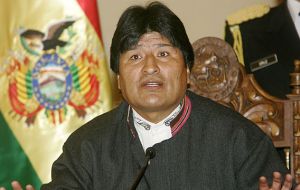MercoPress. South Atlantic News Agency
Bolivia wraps up majority control of oil and telephones
 Pte. Evo Morales ratifies his promised nationalization policy
Pte. Evo Morales ratifies his promised nationalization policy Bolivia announced on Thursday, May first, that it had completed the purchase of majority ownership of four energy companies by buying back shares in the firms as part of a nationalization drive started exactly two years ago.
In a paid advertisement in Bolivia's main newspapers, government owned energy company YPFB said it took control of Andina, previously controlled by Spain and Argentina's Repsol YPF; Chaco, previously held by BP Plc and Pan American Energy as well as pipeline company Transredes, formerly controlled by Ashmore Energy International Ltd. However YPFB did not provide any further details of the operation which the government of President Evo Morales had promised to complete by April 30. The government also said it completed the buyout of storage and fuel transport firm CLHB, controlled by German and Peruvian firms. Bolivia's Energy minister Carlos Villegas said that Bolivia's YPBF will have a stake of 50% plus one share in Andina, the local affiliate of Spain's Repsol-YPF. In the May Workers Day speech to a huge crowd assembled in La Paz President Morales said that "Bolivia wants partners not owners" and also announced the nationalization of the country's main telephone company ENTEL, a subsidiary of Telecom Italia SpA. "Today we are returning ENTEL to the hands of the Bolivian people", said President Morales to a cheering crowd. Bolivia announced plans to buy back a majority of the former state company last year, but negotiations with Telecom Italia have dragged out. However terms of Thursday's nationalization announcement are not clear. Bolivia privatized Entel in 1995 and handed 50% of the company to Stet International in exchange for the Italian company's promise to invest 608 million US dollars to improve service. Stet later merged with Telecom Italia The announcements come just days before the wealthy region of Santa Cruz, home to Bolivia's natural gas reserves and rich farmland, votes in a referendum for autonomy from the central government. Bolivia has South America's second-largest natural gas reserves, after Venezuela, and supplies neighboring Argentina and Brazil with the fuel.




Top Comments
Disclaimer & comment rulesCommenting for this story is now closed.
If you have a Facebook account, become a fan and comment on our Facebook Page!